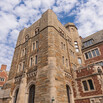Professor Jerome Cohen ’55 Speaks on Law and Power in China
Professor Jerome Cohen ’55, America’s preeminent expert on Chinese law and government, spoke to a standing-room-only audience at Yale Law School on September 12, 2018 on the topic of “Law and Power in China and its Foreign Relations.” A professor at the NYU School of Law and founding director of NYU’s U.S.-Asia Law Institute, Cohen raised grave concerns about China’s continuing restrictions on human rights and the Chinese Communist Party leadership’s consolidation of power under the veneer of law.
WATCH VIDEO OF PROFESSOR COHEN'S TALK4
Professor Cohen’s visit was hosted by the Law School’s Paul Tsai China Center, and he was introduced by the Center’s Director, Professor Paul Gewirtz, as “truly one of a kind...and surely one of the great graduates of this Law School.” Gewirtz noted how Cohen is “a pioneer and legend as a scholar, as a teacher, and as a lawyer in the fields of Chinese law and human rights” and “a great supporter of our China Center.”
On the international front, Professor Cohen’s remarks sounded a somewhat optimistic note. China is “reaching out to the world” in a number of respects, he said. It has assumed a leadership role in the global fight against climate change; it has launched the Asia Infrastructure Investment Bank (AIIB) to support infrastructure projects in other countries; and Chinese President Xi Jinping signaled further openness to globalization and trade in a speech at Davos earlier this year. Although the Chinese leadership denounces talk of “universal values,” Professor Cohen noted that China has at least purported to accept the legitimacy of international law since the recognition of the People’s Republic at the United Nations in 1971.
Domestically, however, Professor Cohen expressed deep concern that the country’s leadership has taken “terrific” action to use law as an instrument to enhance its power. At the 13th National People’s Congress held this March, presidential term limits were removed from the PRC Constitution and a new Supervision Commission was set up to tackle corruption. Many scholars in and outside of China, including Professor Cohen, fear that this new authority was created to give the previously extralegal Communist Party discipline inspection system a semblance of legality while bestowing even greater powers on the Party’s anti-corruption apparatus.
More recently, Western media and human rights groups have reported that as many as a million Uighur Muslims in China’s Xinjiang region have been detained without charge in “re-education camps,” some going months without contact with the outside world. The Chinese Foreign Ministry disputes this figure and says that these camps, their barbed wires visible in satellite images, are in fact “vocational training centers” designed to teach vulnerable populations vocational skills, the Mandarin language, and Chinese law.
In light of this unprecedented crackdown on Muslim religion and culture, Professor Cohen, who has been a champion of human rights and the rule of law throughout his unparalleled legal career, launched the Xinjiang Initiative5 in September, pledging to raise awareness of the mass detentions in Xinjiang at every public event in which he participates. Speaking to Yale students and faculty on September 12, Professor Cohen made a passionate plea for more investigation into this “cultural genocide” by both lawmakers in the United States and scholars of China. He even raised the possibility that the U.S. could invoke the Global Magnitsky Act to sanction Chinese officials directly responsible for this human rights crisis.
Despite these troubling developments, however, Professor Cohen is cautiously optimistic about the future of China, should there be adequate pressure on the Chinese leadership from both domestic and international communities. “Life under the PRC develops in a pendulum way,” Professor Cohen said. “I wrote ‘this too shall pass’ during the height of the conflict in the 1950s and the 1960s. I feel that way now.”


